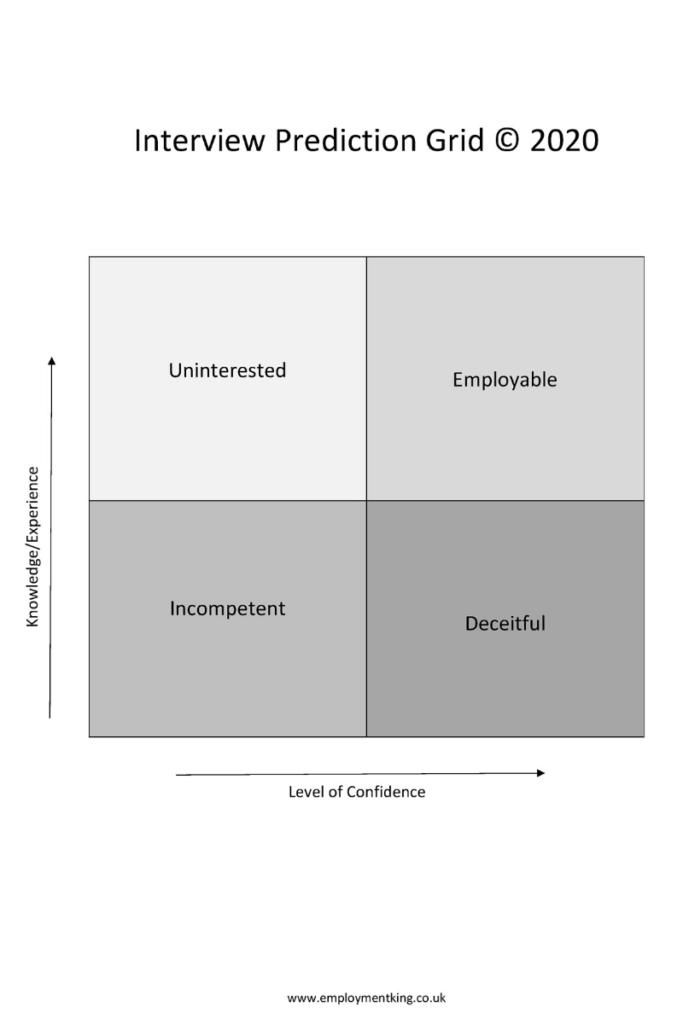There are three main types of job interviewers:
- A cold interviewer
- A warm interviewer
- An expert interviewer
To have regular interview success, applicants need to be able to identify the type of hiring manager in front of them and know how to respond to the interviewer’s behavior.
By understanding the various types of interviewers creates confidence, helping to win over the interviewer and gain more job offers.
In addition to knowing the three interviewer types, career professionals must be aware of their own interview identity – how the applicant is perceived by the interview panel during the recruitment process, and how their interview identity naturally responds to each of the three types of interviewers.
It is these two things, identifying the type of interviewer and understanding how one is perceived in the job interview, that can create a more successful job interview outcome.
The fair interview process.
The goal of any recruitment process is to predict the job performance of each job applicant.
The highest scoring interviewee will, in most cases, be offered the advertised vacancy.
The interview process, therefore, is a logical process. The employer creates a list of essential job criteria, and the applicants interview answers are cross-referenced against the criteria, with each answer being allocated a score or point.
Detailed answers that evidence a high level of knowledge and experience, especially when communicated confidently, will receive the highest possible points.
Not all interviews are equal.
Most recruitment processes aren’t equal, as the interviewer themselves affect the behavior of the interviewee.
Research shows, how an employer that has a natural liking towards a certain applicant will, at the subconscious level, subtly change their behavior that encourages the interviewee to be more open, confident, to give higher-scoring interview answers.
An interviewers opinion of someone, which in turn affects their decision-making process, can be manipulated by any number of things, including:
- Familiarity (affinity bias)
- Social proof
- Positive feelings (an emotional connection)
An interviewee, who is being interviewed by a hiring manager they have a rapport with, will behave differently during the question and answer session than they would when interviewed by an employer they believe doesn’t ‘like’ them.
Applicants in rapport with the employer will:
- Be more willing to share personal opinions, ideas and suggestions
- Give longer and more detailed interview answers
- Share stories and anecdotes
- Feel more relaxed and calm
- Ask more questions, creating a conversation
The four characteristics of an interviewee.
The interview prediction grid model states that there are 16 interview identities that fit into four categories:
- Incompetent
- Deceitful
- Uninterested
- Employable

Incompetent
Incompetent job applicants have a lack of job experience and confidence, resulting in a nervous display during the recruitment process and a misunderstanding of the job interview questions.
Deceitful
The deceitful characteristic comes from a high level of confidence with a low level of industry knowledge and experience. They talk the talk, but can’t walk the walk, resulting in an increase in deceit.
Uninterested
Career professionals with a high level of knowledge and experience, but who lack the confidence to express their competencies during the interview, can be seen as uninterested in the job position – why else would a highly-skilled applicant give short snappy answers?
Employable
Being skilled at communicating competencies confidently creates a persona of being employable, or highly employable. Descriptive and detailed answers, delivered well using a number of non-verbal communication skills, creates likability and desire from the interview start.
Take the interview prediction grid test:

Three Types of Interviewers.
Initially, interviewers can be put into two categories:
- Trained
- Untrained
Generally speaking, high-skilled professionals applying for high-salaried roles in large organisations will be interviewed by a trained HR or hiring manager.
Trained interviewers, often, will have undertaken unconscious bias training, understand the research behind a structured job interview, and will interview with a panel of job interviewers to help create a fairer recruitment process.
In addition, the recruitment process is likely to consist of 3-6 rounds of interviews, with applications being ‘blind’ – removing the candidate’s name, age, higher educational institute, to help remove any pre-interview unconscious biases.
For low to medium-skilled roles, or in small organisations, the applicant is likely to be interviewed by their potential new line manager.
In this situation, the line manager is unlikely to have undertaken any in-depth interview training and may not be aware of the effects of unconscious bias.
The interview will consist of, on average, one or two interview rounds by one or two interviewers.
In this case, it is likely that the interviewer(s) will be just as nervous as the applicant.
The three interviewer types; cold, warm and expert, can each be either a trained or untrained interviewer.
There has been much research conducted on the impact of the interviewer’s behavior, including verbal and non-verbal communication.
To spot the type of interviewer requires observation. The three types will give their identity away with telltale signs:
A cold interviewer will:
- Frown
- Sigh
- Avoid eye contact or stare
- Clock watch
- Ask closed questions
- Doesn’t smile
- Doesn’t ask follow up questions
- Be dismissive
A warm interviewer will:
- Smile
- Nod along with the applicant
- Have strong eye contact
- Be more personable
- Ask follow up questions
- Be re-assuring
- Creates a conversation
- Put the applicant at ease
- Encourage with gestures and open body language
An expert interviewer will:
- Naturally use industry jargon and acronyms
- State sector related theories and models
- Have a strong opinion
- Challenge generalizations or data/information they believe is incorrect
- Request specific examples and evidence
- Ask for the applicants opinions
- Come across as an authority/expert which they are
The four different interview identities will respond differently to each of the three job interviewer types.
The natural response to a cold, warm or expert interviewer.
Awareness creates change.
By understanding the interviewer types and the applicant’s own interview identity creates awareness. With awareness comes change.
A cold interviewer.
A cold interviewer increases the anxiety of a low confident interviewee, the incompetent and uninterested applicant.
This is because a lack of self-esteem creates an internal focus, leading to job candidates questioning whether the interviewer’s negative behavior is due to how they are acting in the job interview.
Whereas high-confident individuals have an external focus. In an article on scientific America, they say “If the interviewer is cold, highly confident candidates are able to externalize the behavior and not believe that it directly reflects on them.”
The more confident an applicant is, the more consistent their (confident) interview performance is.
A warm interviewer.
The encouraging nature of a warm interviewer, research shows, gets the ‘best’ out of the interviewees, which in turn allows the employer to predict the job performance of applicants.
Even an anxious applicant, an incompetent or uninterested interview identity, will perform much better – give higher-scoring interview answers when interviewed by a warm interviewer.
In fact, the more personable approach of a warm interviewer, prior to the question and answer stage of the interview IE the asking of non-job-related questions “did you find us OK?” or “how was your weekend?”, can help some applicants evolve their interview identity to the most successful quadrant, the employable interview identity.
The interview identity, as we have said, is the perceived level of knowledge and experience vs the level of confidence of the applicant in the job interview.
Therefore, the friendly nature of the warm interviewer can increase an experienced applicant’s confidence level, which in turn improves how that candidate answers the interview questions- giving more descriptive and detailed interview answers.
A warm interviewer encourages confident interviewees – the deceitful and employable interview identity, to be more self-assured leading to an increase in self-promotion.
The deceitful interview identity candidate will have conviction in their own statements, and even argue points with an interviewer. When interviewed by an ‘expert’ interviewer, the interviewer will challenge anything they view as inaccurate which creates the ‘deceitful’ identity.
But, if the warm interviewer isn’t an expert and/or lacks confidence themselves, the deceitful applicant can instead be viewed as having an ’employable’ interview identity.
An expert interviewer.
An expert interviewer can be ‘warm’ or ‘cold’. The difference is the expert has a wide range of sector-related knowledge and expertise, and the confidence to challenge an interviewee’s answers/knowledge to better to predict the job performance of each applicant.
Low levels of knowledge and experience applicants, the incompetent and the deceitful interview identities, are quickly recognized as not having the required level of competencies by the expert interviewer.
The expert interviewer is often interested in evidence-based interview answers, they preference data and use logic to help make hiring decisions. This analytical process becomes the barrier to anyone but the most experienced and knowledgeable career professionals,
Confidence is an important factor when interviewed by an expert. Confidence creates self-promotion. The employable interview identity, compared to the uninterested interview identity, will deliver descriptive, self-promoting and evidence-based answers that can be easily cross-referenced against the interview scorecard.
Uninterested interview identity candidates have the same level of experience and knowledge as an employable identity but lack that all-important ingredient – confidence.
It is the lack of confidence, that decreases communication. At the worst, the uninterested applicant has imposture syndrome and will self-declare a high number of weaknesses, at best their answers are positive but lack detail.
The expert interviewer may be aware of the higher level of knowledge and experience and even ask follow-up questions. But, if an applicant doesn’t state the required criteria on the interview scorecard it is unlikely they will be in the top 3 high-scoring applicants.
It is the lack of sharing information, being aloof and presenting short snappy interview answers that creates the identity of being uninterested in the job role/interview.
The structured job interview is designed to be a logical process, with answers being cross-referenced against the job criteria before being given a score.
Employers want to hire the most suitable applicant. This is the goal of every recruitment process. The ‘interview identity’ is created during the answers to the first interview answer. It is a generalisation of the suitability or unsuitability of an applicant for the advertised position.

If the interview identity is a negative identity, most employers will simply want the interview to end as quickly as possible. This can lead to a ‘warm’ interviewer, acting more ‘cold’ than they normally would do.
If an interview is going badly, the applicant needs to change their approach to win the interviewer around. The ‘what is your interview identity’ book explains actions the interviewee can take during the recruitment process.
5 signs that an employer likes the interviewee.
- The interviewer will ask a more specific follow up questions to gain a more detailed answer
- A cold interviewer will act more warm; smiling, nodding, eye contact
- The interview panel will discuss how (the interviewers answer/knowledge) would help them solve a particular barrier
- Employer will disclose how they like the applicant
- Additional questions about the applicants situation will be asked; notice period, if the applicant has other job interviews










